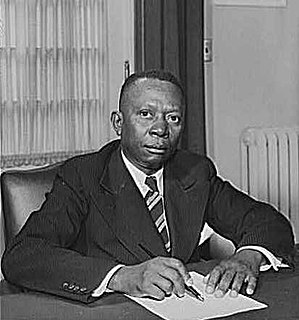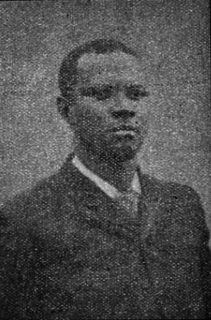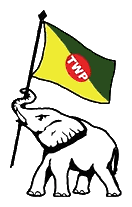
Politics of Liberia takes place in a framework of a presidential representative democratic republic modeled on the government of the United States, whereby the President is the head of state and head of government; unlike the United States, however, Liberia is a unitary state as opposed to a federation and has a pluriform multi-party system rather than the two-party system that characterizes US politics. Executive power is exercised by the government. Legislative power is vested in both the government and the two chambers of the legislature.

The President of the Republic of Liberia is the head of state and government of Liberia. The president serves as the leader of the executive branch and as commander-in-chief of the Armed Forces of Liberia.

William Vacanarat Shadrach Tubman was a Liberian politician. He was the 19th President of Liberia, serving from his election in 1944 until his death in 1971.

Garretson Wilmot Gibson was the 14th President of Liberia from 11 December 1900, to 4 January 1904. Born in Maryland, in the United States, his family emigrated to Liberia in 1845. After receiving an education in mission schools, he returned to Maryland to study theology. Ordained a priest, he served as rector of the Episcopalian Trinity Church in Monrovia. He also served as Chaplain of the Liberian Senate. Later, he served as President of the Trustee Board of Liberia College and at one time President of the College.

Arthur Barclay was the 15th President of Liberia, serving from 1904 to 1912.

The 1997 Liberian general election was held on 19 July 1997 as part of the 1996 peace agreement ending the First Liberian Civil War. The presidency, as well as all seats in the House of Representatives and the Senate were up for election. Voter turnout was around 89%. Former rebel leader Charles Taylor and his National Patriotic Party (NPP) won the election by a substantial margin; Taylor won 75.3% of the vote in the presidential election, whilst the NPP won the same number of votes in the parliamentary election. Taylor was inaugurated as president on 2 August 1997.

The Legislature of Liberia is the bicameral legislature of the government of Liberia. It consists of a Senate – the upper house, and a House of Representatives – the lower house, modeled after the United States Congress. Sessions are held at the Capitol Building in Monrovia. Legislature of Liberia is considered one of the three branches of government based on the Article III of the Constitution of Liberia that stipulates all three branches ought to be equal and coordinated based on the Principle of checks and balances.

The Vice President of the Republic of Liberia is the second-highest executive official in Liberia, and one of only two elected executive offices along with the President. The Vice President is elected on the same ticket with the president to a six-year term. In the event of the death, resignation or removal of the president, the Vice President ascends to the presidency, which he or she holds for the remainder of their predecessor's term. The Vice President also serves as the President of the Senate and may cast a vote in the event of a tie. The current Vice President is Jewel Taylor, serving under President George Weah. She began her term on January 22, 2018.
Clarence Lorenzo Simpson (1896–1969) was a politician in Liberia. He was Secretary of State during much of World War II (1934–1943) under President Edwin Barclay.

General elections were held in Liberia in 1903. In the presidential election Arthur Barclay of the True Whig Party was elected. He defeated former President William D. Coleman, who ran on the People's Party ticket. Barclay took office on 4 January 1904

General elections were held in Liberia in 1905. In the presidential election Arthur Barclay of the True Whig Party was re-elected. He defeated former President William D. Coleman, who ran on the People's Party ticket.

General elections were held in Liberia in 1907. In the presidential election Arthur Barclay of the True Whig Party was re-elected for a third term. It was the first time a President had been elected to a four-year term, as all had previously served for two years.

General elections were held in Liberia in 1927. In the presidential election, the result was a victory for Charles D. B. King of the True Whig Party, who was re-elected for a third term after defeating Thomas J. Faulkner of the People's Party.

General elections were held in Liberia in 1939. It was the first presidential election since 1931, as special legislation approved by a referendum in 1935 had extended Edwin Barclay's term from four to eight years. Barclay, a member of the True Whig Party, was the only candidate, and was re-elected unopposed.

A constitutional referendum was held in Liberia on 7 May 1935, alongside general elections. The changes to the constitution ensured that President Edwin Barclay remained in office without the need for the presidential elections due that year. Although it was claimed to be for economic reasons, the government feared that an election may lead to instability that would lower confidence of foreign powers and creditors. The next elections took place in 1939.

Joseph D. Summerville served as the 15th Vice President of Liberia from 1902 until his death in 1905 under Presidents Garretson W. Gibson and Arthur Barclay, making him the only person to serve as vice president under two separate presidents.
Jackson Fiah Doe was a Liberian politician in the late twentieth century.

The 1980 Liberian coup d'état happened on April 12, 1980, when President William Tolbert was overthrown and murdered in a violent coup. The coup was staged by an indigenous Liberian faction of the Armed Forces of Liberia (AFL) under the command of Master Sergeant Samuel Doe. Following a period of transition Doe would go on to rule the country throughout the 1980s until his murder on 9 September 1990 during the First Liberian Civil War.












